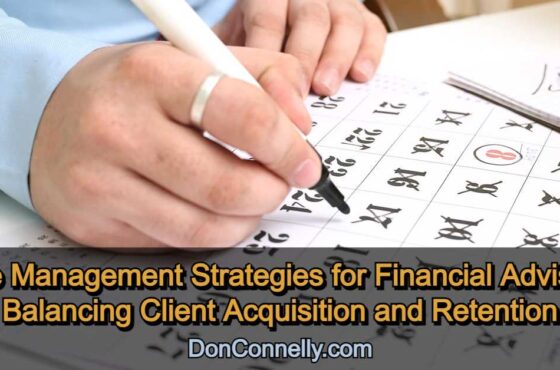Strengths or Weaknesses: Where Should Advisors Focus?
 Getting to the next level in any endeavor requires a thorough understanding of your strengths and weaknesses. Your strengths have the potential to power your advancement, while weaknesses could possibly hold you back. But not all strengths and weaknesses are equal in the way they can impact your practice. The challenge for advisors is knowing whether to focus first on their weaknesses and then their strengths or vice versa.
Getting to the next level in any endeavor requires a thorough understanding of your strengths and weaknesses. Your strengths have the potential to power your advancement, while weaknesses could possibly hold you back. But not all strengths and weaknesses are equal in the way they can impact your practice. The challenge for advisors is knowing whether to focus first on their weaknesses and then their strengths or vice versa.
The strength or weakness focus debate
Strengths are those activities you do exceptionally well and you enjoy doing them. They can differentiate you from other advisors. Weaknesses are those functions or activities you feel you don’t do well and you avoid doing them. For many advisors, their human nature dictates they identify their weaknesses and work to improve them to grow as an advisor. Others will emphasize their strengths as means to advance while nurturing their weaknesses.
One school of thought says that focusing on your weaknesses is not the right course because you aren’t likely to make significant enough progress to move the needle so that it can be a drain on your time and energy. Instead, focus on your strengths, not just because you enjoy doing them, but to become exceptional at them and build your value proposition around them. Your strengths give you motivation and energy.
But what if one of your weaknesses is an area that is critical to the growth of your practice? You may be exceptional at motivation and organization, but you’ll find it difficult to get and retain clients if you have trouble building a deep connection with people. Building rapport and demonstrating empathy are core soft skills that can’t be set aside or outsourced.
Or, maybe one of your strengths is you are blessed with the gift of gab, enabling you to exude charm as you strike up a conversation with anyone. But strengths can be overused, which can turn them into weaknesses. The gift of gab can become annoying if you talk too much or fail to make your prospect or client the center of your conversation.
The critical importance of identifying your strengths and weaknesses
It’s essential to identify all your strengths and weaknesses. Most people can conduct a thorough assessment with the assistance of another person—a colleague, friend, spouse, or even your clients. You can start by listing them on your own by answering a few questions.
For strengths:
- What do you do better than most advisors?
- What do you enjoy doing?
For weaknesses:
- What do other advisors do better than you?
- What activities do you not enjoy or avoid doing?
Putting your strengths and weaknesses in the context of the next level
The next step is to identify which strengths are critical for getting to and succeeding at the next level. Highlight those strengths that, if exercised and improved upon, will add value and help you grow your practice.
Likewise, identify those weaknesses that, if they persist, will derail your progress. For example, you can’t expect to advance very far if you don’t master your soft skills, such as proactive listening, demonstrating empathy, asking probing questions, or telling a good story. If you have difficulty getting prospects or clients to relate to you or motivating them to take action, that’s a weakness that must be turned into a strength immediately.
However, if your weakness is a lack of organizational abilities, you might be better off outsourcing that function to an assistant rather than spending time and energy trying to improve it. The challenge is many functions, and skills advisors need to perform cannot be outsourced. In addition to some that we’ve already mentioned, advisors can’t succeed without the ability to handle rejection or stress, think practically, or talk their clients down from a ledge.
Build on your strengths and turn weaknesses into opportunities
Some advisors have an innate talent for these, but others don’t. The key to success is to have the self-awareness to honestly identify your weaknesses and turn them into opportunities for growth. In doing so, it’s essential always to keep your strengths at the forefront because they help you generate a positive attitude to keep going.
Watch this 3-minute video to learn how our 24-step training program can help you develop and hone the soft skills you need to get to the next level.
See program details and enroll today!
Available as a self-paced program (always open) or as a 12-week coaching program (open only a couple of times a year), this program will change the way you view your practice. Select your format and enroll today!



